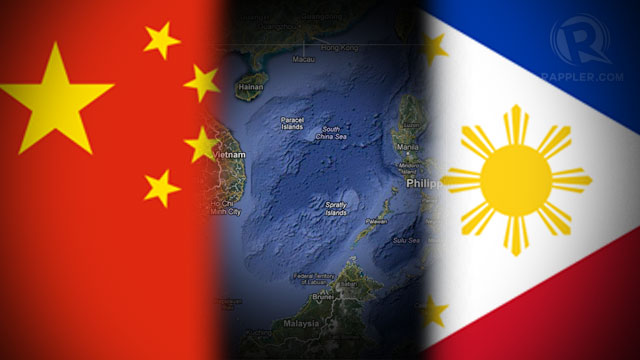Relying on certain clauses of the United Nations Convention on the Law of the Sea (UNCLOS) of 1982, to which both the Philippines and China are parties, the Philippines has started an arbitration procedure against China. This procedure concerns the status of many features in the South China Sea and the legality of the conduct of China in some incidents occurred in that Sea. The arbitration has resulted in an award handed out on 29 October 2015 in which the Tribunal affirmed its right to adjudicate (jurisdiction), on about half of the Philippines’ submissions, and stated that jurisdiction and the merits are linked on the remaining submissions. So the Tribunal did not exclude to have the right to adjudicate any of the Philippines’ submissions. The award on the merits will concern all these submissions. It will probably be handed out in the near future.

China made very clear since the beginning of the procedure that: “it will neither accept nor participate in the arbitration . . . initiated by the Philippines.”
This position has been criticized as inconsistent with the fact that, being bound by the UNCLOS, China is also bound by the provisions in that Convention providing that a case concerning the interpretation and application the Convention may be submitted unilaterally, by one State party, to a court or tribunal, including arbitral tribunals.
As will be shown, in fact, China’s position is perfectly legal under international law. The Award of the Tribunal does not deny such legality, but it considers China’s position only in part.
China’s position consists in two distinct statements. The first is that China does not accept the arbitration. The second is that China will not participate in it. The 2015 Arbitral Award considers in some detail China’s non-participation in the arbitration, but treats only cursorily its non-acceptance (or “rejection”) of it.
Non-acceptance may be seen as a political statement underlining that, with its initiative, the Philippines acts in contradiction with numerous statements, declarations and agreements in favour of friendly negotiations.
Of course, this political meaning is included in China’s non-acceptance of the arbitration. However, such non-acceptance has also a specific legal meaning. It conveys the message, that, as stated by China in a Position Paper of December 2014, “[t]he unilateral initiation by the Philippines of the present arbitration constitutes an abuse of the compulsory procedures provided in the Convention.”
The Tribunal did not consider seriously the “non-acceptance” of the arbitration as distinguished form “non-participation”. It simply states that the language used by China “calls to mind” UNCLOS articles 300 or 294. The Tribunal comes to the correct conclusion that these articles are not relevant, but does not pursue its analysis further.
In light of the evident aim of the Philippines’ Submissions to circumvent the limits of compulsory jurisdiction under the UNCLOS, the notion of abuse of legal proceedings should have been examined in detail at a very preliminary stage.
It must be regretted that the Tribunal did not consider seriously the Chinese “non-acceptance” of, as distinguished from “non-participation” in, the arbitration. Doing so could have brought the Tribunal to discuss seriously this very general aspect of the case which is the one China is most keen about, and which explains its non-participation. Such serious examination – whatever its results – would have been necessary in order to ensure the balanced treatment of the parties.
Non-participation by China to the arbitral proceedings has raised particular attention in light of the discussions among scholars whether there is a duty to appear or, on the contrary, an absence of such duty or even a right to non-appearance.
In the Statute of the International Court of Justice as well as in Annexes VI and VII of UNCLOS, no duty to appear is mentioned. Similarly to corresponding provisions of the Statutes of the International Court of Justice and of the International Tribunal for the Law of the Sea, art. 9 of Annex VII of UNCLOS, applicable to arbitrations such as the Philippines v. China one, states that
If one of the parties to the dispute does not appear before the arbitral tribunal or fails to defend its case, the other party may request the tribunal to continue the proceedings and to make its award. Absence of a party or failure of a party to defend its case shall not constitute a bar to the proceedings. Before making its award, the arbitral tribunal must satisfy itself not only that it has jurisdiction over the dispute but also that the claim is well founded in fact and law.
Based on this and similar provisions, the consequences drawn from non-appearance by international Courts and Tribunals aim at balancing the positions of the two parties, by permitting the continuation of the case and by avoiding detriment to either party. It would seem correct to say that non-appearance is a mere possibility, a fact on which no value judgment is expressed, from which the applicable provisions draw certain consequences. In legal terms it may be said, in my view, that a party to a dispute has a right not to appear, and that, when it exercises such right it is pursuing a perfectly legitimate procedural course of action in light of the consequences, positive and negative, well known to it, provided for in the applicable provisions.
Negative remarks on the legality of non-appearance are not to be found in the judgments of international Courts and Tribunals or in the Philippines v. China 2015 award. The most that emerges in this sense from jurisprudence are mentions of “regret” or invitations to take into account a “duty” to cooperate with the Court.
The only case of non-appearance in an arbitration under UNCLOS Annex VII – the same procedure as in Philippines v. China – is no exception. This was the Arctic Sunrise case submitted by the Netherlands against Russia which decided not to participate in the proceedings. While remarking that Russia’s absence had “deprived the Tribunal of the benefit of Russia’s views on the factual issues before it and on the legal arguments advanced by the Netherlands”, the Arbitral Tribunal confirmed that “non-participation by a State party in any of the compulsory procedures entailing binding decisions provided for in Section II of Part XV of the Convention, including arbitration, affects neither the jurisdiction of the tribunal in question nor the binding nature of any final decision rendered by that tribunal”.
In the provisional measures phase of the Arctic Sunrise case, which was held before the International Tribunal for the Law of the Sea, two judges criticized strongly Russia’s decision not to appear. In a Separate Opinion, they stated that: “non-appearance is contrary to the object and purpose of the dispute settlement system under Part XV of the Convention” and that:
Judicial proceedings are based on a legal discourse between the parties and the co‑operation of both parties with the international court or tribunal in question. Non-appearance cripples this process.
These views have not found an echo in the Order on Provisional Measures issued in 2013 by the International Tribunal for the Law of the Sea. Thus, the Tribunal rejects the view that there is a duty to appear and concurs with the view that there is a right not to participate, or at least, that non-participation is a fact to which no value judgments attach, and from which the ITLOS Statute draws certain consequences.
It seems particularly noteworthy that, notwithstanding the presence of one of the two above-mentioned Judges as an arbitrator in the Philippines v. China case and that the Tribunal’s attention was drawn in pleadings by the Philippine’s advocates on the Judge’s position during the hearing, in the Award there is no mention of the position held by this judge in his Separate Opinion, or of the views put forward in it. This seems supports of the view that the Tribunal rejects the opinion that there is a duty to appear, and that it endorses the position, held by China, that non-appearance is a right or at least a factual situation to which no value judgment attaches.
At a formal level China’s non‑appearance was treated as a right. The Tribunal viewed China’s attitude with respect and did not even indulge in discussing views, which are present in some scholarly writings, and also, as we have seen, in an opinion of one of its members, that non-appearance is a violation of the duties of a party to a dispute. Since the beginning of the case, the Tribunal made an effort to treat the parties equally and to analyse all issues in order to satisfy itself of its jurisdiction. However, the effort to guess the positions China might have taken and the constant stimulation exercised by the Tribunal on the Philippines in order to make it further elaborate on issues the Tribunal considered as interesting, might have put China in a position of disadvantage.
(This article is a summary of a section of an Opinion prepared upon request of the Government of the People’s Republic of China.)



